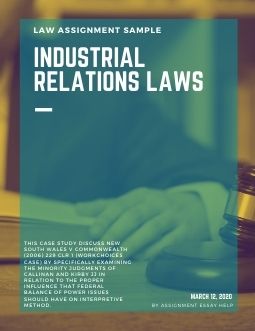
You can download the solution to the following question for free.
For further assistance in Law Assignment help, please check our offerings in Law Assignment solutions. Our subject-matter-experts provide online assignment help to law students from across the world and deliver plagiarism free solution with free Turnitin report with every solution.
(AssignmentEssayHelp do not recommend anyone to use this sample as their own work.)
Law Assignment Question
Critically discuss New South Wales v Commonwealth (2006) 229 CLR 1 (WorkChoices Case) by specifically examining the minority judgments of Callinan and Kirby JJ in relation to the proper influence that federal balance of power issues should have on interpretive method.Law Assignment Answer
The WorkChoices reforms came to be passed in December 2005 by the Australian Federal Parliament, in December 2005. The two most fundamental legal changes were:
i. The federal industrial scenario was made independent of the State and Territory jurisdiction with respect to the workplace relations legislation; and
ii. The attempts to depend almost entirely on the powers of the corporations – to directly provide conditions of employment and minimum regardless of the presence of an intrastate industrial dispute. The enactment came to be challenged by a certain state, along with the Australian Workers’ Union and Unions New South Wales, with the Northern Territory, the State of Tasmania, and the Capital Territory of Australia later joining as additional plaintiffs. The case was heard by the Constitutional Bench of the High Court of New South Wales. What the Australian Government contended was that the Act drafted in consonance with Section 51(xx) of the Constitution, more familiar as “the corporations’ power”, which gives Australian Parliament the power of legislation with respect to “foreign corporations, and trading or financial corporations formed within the territory of the Commonwealth.”
3 The plaintiffs’ contention, on the other hand, was that the enactment was not invalid under the Australian Constitution, as it violated its very structure and spirit, the principle point thereby being that the power of the corporations was outside the ambit of the legislation. It argued that in other laws relying on corporations’ power, it manifestly apparent that they were made with respect to the corporations, whereas the Work Choices legislation directs more at industrial relations than at the corporations………..


 WhatsApp Us
WhatsApp Us